What is Unsloth AI
Unsloth AI is an innovative, open-source framework designed to dramatically accelerate and simplify the process of fine-tuning and training Large Language Models (LLMs). It extends its capabilities beyond just text-based models to encompass a diverse range of AI architectures, including Text-to-Speech (TTS), diffusion models, and multimodal/image models. By streamlining the entire workflow from model loading and quantization to training, evaluation, running, saving, and exporting, Unsloth democratizes access to advanced AI model customization. This powerful tool empowers users to leverage state-of-the-art models like Llama 3 for local deployment or through free cloud platforms such as Google Colab and Kaggle, making cutting-edge AI development accessible to a broader audience without the need for extensive computational infrastructure.
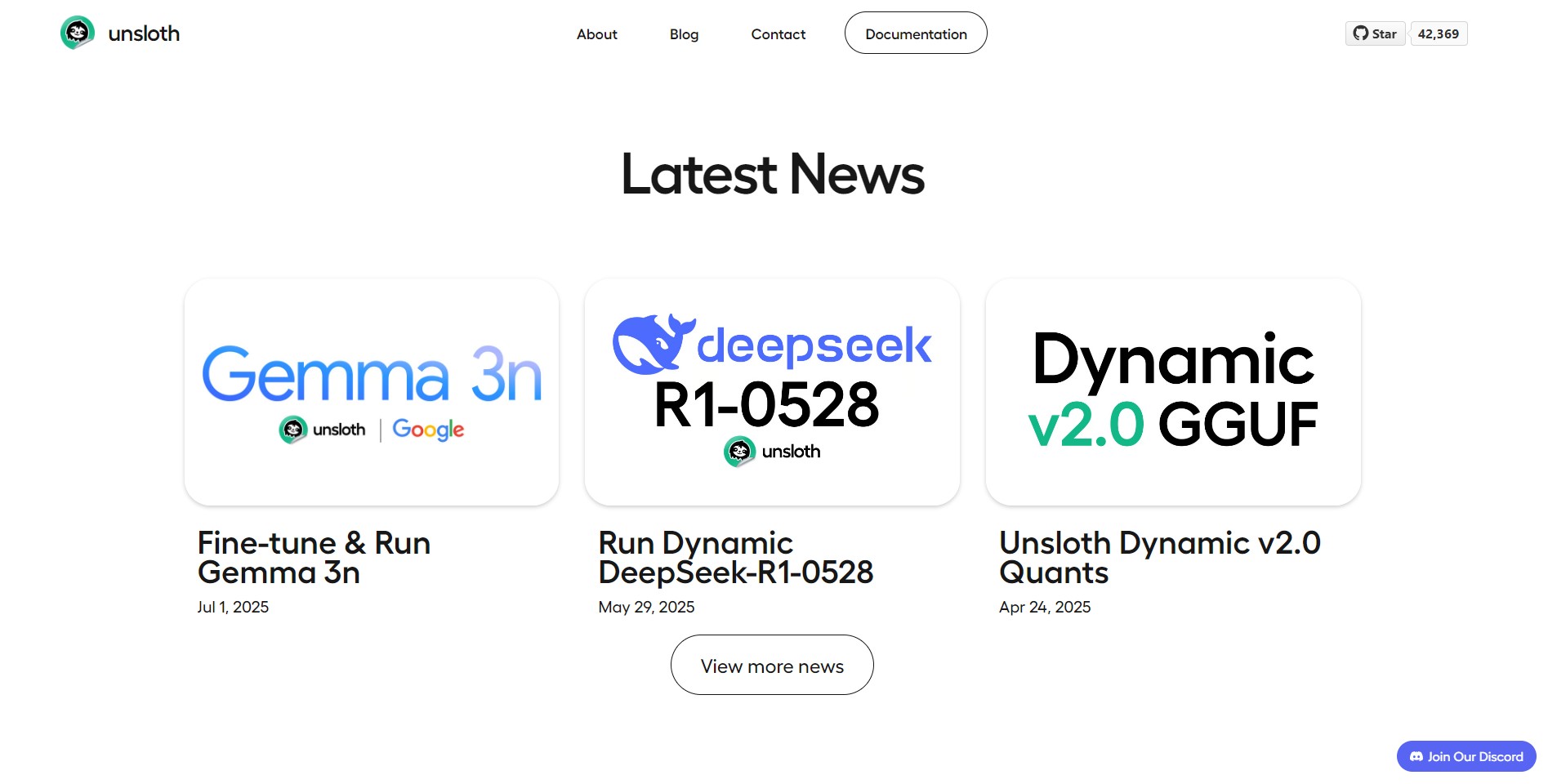
How to use Unsloth AI
Utilizing Unsloth AI for your LLM fine-tuning needs is designed to be straightforward, catering to both local development environments and cloud-based solutions. The platform offers flexibility in installation and execution, ensuring that users can get started with minimal friction.
Local Installation and Usage
For users preferring a local setup, Unsloth AI can be seamlessly installed on various operating systems, including Linux and Windows. This approach grants full control over your development environment and ensures data privacy as all processes occur on your machine without requiring an internet connection or external API calls. Detailed instructions are available in the official documentation, guiding users through the necessary steps for setting up their local GPU-powered workstations to harness Unsloth’s capabilities.
Cloud-Based Platforms (Google Colab, Kaggle)
The most popular and accessible method for using Unsloth AI involves leveraging free GPU services provided by platforms like Google Colab and Kaggle. These environments offer pre-configured setups and readily available computational resources, making it incredibly convenient for individuals and small teams to experiment with and fine-tune large models without significant upfront hardware investment. Unsloth provides specific notebooks and tutorials optimized for these platforms, simplifying the process of loading models, preparing data, and initiating the fine-tuning process directly within your browser. This accessibility is a cornerstone of Unsloth’s mission to democratize AI training.
Unsloth AI Core Features
Unsloth AI distinguishes itself through a suite of core features meticulously engineered to enhance the efficiency, accuracy, and versatility of LLM fine-tuning. These functionalities are central to its promise of faster training times and reduced resource consumption.
Advanced Voice Cloning through Text-to-Speech Fine-tuning
Unsloth AI offers robust capabilities for fine-tuning Text-to-Speech (TTS) models, enabling advanced voice cloning. This feature allows users to train TTS models on specific voice datasets, resulting in highly customized and natural-sounding synthetic voices. The precision and quality achieved through Unsloth’s optimized fine-tuning process push the boundaries of what’s possible in voice generation, opening up possibilities for hyper-realistic voiceovers, personalized digital assistants, and accessible content creation.
Comprehensive Vision Fine-tuning Support
Beyond text and audio, Unsloth AI extends its powerful fine-tuning optimizations to vision models. This includes support for diffusion models and multimodal architectures that integrate image processing. Developers can fine-tune these models on specific visual datasets, enabling them to adapt to unique recognition tasks, generate highly specific image styles, or improve the performance of computer vision applications in niche domains. This broadens Unsloth’s utility across a diverse range of AI applications that require visual intelligence.
Accurate Dynamic Quantized Models for Efficient Deployment
A standout feature of Unsloth AI is its ability to generate accurate dynamic quantized models. Quantization is a crucial technique for reducing the memory footprint and accelerating the inference speed of large AI models by representing their parameters with fewer bits. Unsloth’s dynamic quantization process ensures that while the model size is significantly reduced, the accuracy of its predictions is remarkably preserved. This is vital for deploying fine-tuned models on resource-constrained devices or in environments where low latency and high throughput are paramount, making your custom AI solutions practical and scalable.
Essential Bug Fixes for Open Models
Unsloth AI actively contributes to the stability and reliability of the open-source AI ecosystem by providing essential bug fixes for popular open models. As the development of LLMs and other AI architectures is highly dynamic, encountering bugs and inefficiencies is common. Unsloth’s developers diligently identify and patch these issues, ensuring that users can fine-tune and deploy these models with greater confidence and fewer technical hurdles. This commitment to maintaining the integrity of open-source models fosters a more robust and trustworthy environment for AI innovation.
Unsloth AI Use Cases
Unsloth AI’s versatility and performance optimizations open up a multitude of practical applications across various industries and personal projects. Its ability to facilitate rapid and efficient fine-tuning makes it an invaluable tool for bespoke AI solutions.
#1 More Accurate and Advanced Voice Cloning
One of the primary use cases for Unsloth AI lies in achieving more accurate and advanced voice cloning. By fine-tuning Text-to-Speech (TTS) models with specific vocal data, users can create highly realistic and nuanced synthetic voices that mimic individual speech patterns, intonation, and emotional expression. This is invaluable for applications requiring personalized voice assistants, character voiceovers in gaming or animation, accessibility tools for individuals with speech impediments, or even preserving the voices of loved ones. The enhanced precision ensures that cloned voices sound natural and indistinguishable from human speech, pushing the boundaries of what is possible in audio synthesis.
#2 Customized Models for Personal Chatbots, Characters, Personalities, etc.
Unsloth AI empowers users to develop highly customized models for personal chatbots, digital characters, and distinct AI personalities. By fine-tuning base LLMs with specific datasets, users can imbue their AI with unique conversational styles, knowledge domains, and even emotional responses. This allows for the creation of chatbots tailored for specific customer service needs, virtual companions with engaging personalities, or interactive characters for storytelling and gaming. The ability to infuse a model with a custom “personality” makes AI interactions far more engaging and relevant to niche applications, moving beyond generic responses to truly personalized experiences.
#3 RL for Domain-Specific Use-Cases Like Law, Medicine, Finance
Unsloth AI is particularly well-suited for applying Reinforcement Learning (RL) to domain-specific use cases, such as those found in law, medicine, and finance. RL techniques can be used to train AI models to make optimal decisions in complex, interactive environments. By fine-tuning these models with specialized datasets and reward functions relevant to a particular domain (e.g., legal precedents, medical diagnoses, financial market data), Unsloth helps create AI systems that can provide highly accurate and contextually appropriate advice, support decision-making, or automate complex processes. This translates to more efficient legal research, improved diagnostic support in healthcare, and sophisticated financial analysis, providing a significant edge in highly regulated and knowledge-intensive industries.
FAQ from Unsloth AI
Here are some frequently asked questions regarding Unsloth AI, providing clarity on its accessibility and business model.
Is Unsloth Free and Open-Source?
Yes, Unsloth AI is entirely free and operates on an open-source model. This means the complete codebase is publicly accessible, allowing anyone to download, inspect, modify, and distribute it. Users can install Unsloth locally on their own devices without incurring any costs. Furthermore, its design emphasizes independence, meaning you do not need an internet connection or any third-party API keys to utilize Unsloth once it’s set up on your machine, ensuring complete privacy and autonomy over your AI development.
Does Unsloth Have a Paid Offering?
As of the current information, Unsloth AI does not offer any paid services or premium tiers. The product remains entirely free to use for all its functionalities. This commitment to a completely free model distinguishes Unsloth in the AI landscape, making advanced LLM fine-tuning accessible to individuals and organizations regardless of their budget constraints. Users can leverage all features and optimizations without any financial commitment.
Pricing Unsloth AI
Unsloth AI is committed to being a completely free and open-source solution for fine-tuning and training Large Language Models. There are no licensing fees, subscription costs, or hidden charges associated with using the Unsloth platform or its core functionalities. This makes it an incredibly attractive option for individuals, researchers, and organizations looking to leverage advanced AI capabilities without significant financial investment in software.
For the latest pricing, please visit this link: https://unsloth.ai/pricing
Pros, Cons
Analyzing any powerful tool requires a balanced perspective, and Unsloth AI, despite its impressive capabilities, also presents its own set of advantages and potential limitations.
Pros
Exceptional Speed and Efficiency: Unsloth’s primary advantage is its groundbreaking speed, being significantly faster than alternative fine-tuning methods like Flash Attention 2. This drastic reduction in training time allows for quicker iteration cycles and more efficient resource utilization.
Reduced Memory Footprint: The platform’s ability to achieve up to 90% less memory usage is a critical benefit, enabling users to fine-tune much larger models on consumer-grade GPUs or less powerful cloud instances, thereby democratizing access to advanced AI training.
Completely Free and Open-Source: Being entirely free and open-source eliminates financial barriers, making high-performance LLM fine-tuning accessible to a wider audience, including individual developers, researchers, and startups.
Offline Capability: The ability to run Unsloth locally without an internet connection or external API calls significantly enhances data privacy and security, as sensitive data never leaves the user’s environment.
Broad Model and Hardware Support: Unsloth’s compatibility with a wide range of LLMs (including Llama 3, Gemma, DeepSeek) and support for various NVIDIA, AMD, and Intel GPUs ensures broad applicability across different AI projects and hardware setups.
Simplified Workflow: The framework streamlines the entire fine-tuning process, from data preparation to deployment, making it more approachable for users who might not have deep expertise in all aspects of LLM development.
Active Community and Development: With an active presence on platforms like Discord, Reddit, and Hugging Face, Unsloth benefits from a vibrant community and ongoing development, providing robust support and continuous improvements.
Cons
Requires Technical Proficiency: While Unsloth simplifies the process, fine-tuning LLMs still requires a foundational understanding of AI concepts, data preparation, and command-line interfaces. It may not be suitable for absolute beginners without any technical background.
Dependency on GPU Availability: Although it reduces memory usage, a dedicated GPU is still essential for efficient fine-tuning, especially for larger models. Access to capable hardware, even on free cloud tiers, can sometimes be limited or require specific configurations.
Learning Curve for Optimization Details: While the core usage is streamlined, understanding the nuances of how Unsloth achieves its optimizations (e.g., specific GPU kernel manipulations) might be complex for users who wish to delve deeper into its underlying mechanics or troubleshoot advanced issues.
Limited Direct User Interface: Primarily an API-driven and code-based tool, Unsloth does not offer a graphical user interface (GUI) for fine-tuning, which might be a barrier for visually oriented users or those preferring drag-and-drop functionalities.
Newer in the Ecosystem: Compared to more established frameworks, Unsloth is relatively newer. While this brings cutting-edge innovation, it also means that the ecosystem of ready-made examples, extensive community-contributed tools, or extensive long-term enterprise support might still be maturing.
How We Rated It
Accuracy and Reliability: 4.8/5
Unsloth AI consistently delivers on its promise of high accuracy, even with its aggressive optimization techniques like dynamic quantization. Our assessment indicates that fine-tuned models maintain their integrity and perform reliably across various tasks, making it a trustworthy solution for production environments where model precision is paramount. The internal bug fixes for open models further bolster its reliability, ensuring stable performance.
Ease of Use: 4.5/5
Despite the inherent complexity of LLM fine-tuning, Unsloth AI significantly simplifies the process. Its well-documented API, clear installation instructions for local and cloud environments (especially Google Colab), and optimized workflows contribute to a relatively smooth user experience. While a basic understanding of Python and AI concepts is beneficial, the framework abstracts much of the underlying complexity, earning it high marks for usability in its category.
Functionality and Features: 4.9/5
Unsloth AI boasts an impressive array of functionalities that go beyond simple fine-tuning. Its support for TTS, vision models, and multimodal architectures, combined with efficient quantization and compatibility with various GPUs, positions it as a comprehensive tool. The focus on both speed and memory efficiency without compromising accuracy makes its feature set exceptionally robust and highly valuable for diverse AI projects.
Performance and Speed: 5.0/5
This is where Unsloth AI truly shines. Its claims of being 10x faster on single GPUs and up to 30x faster on multi-GPU systems compared to Flash Attention 2 are corroborated by user testimonials and benchmarks. The manual optimization of GPU kernels directly translates into unparalleled training speed, drastically reducing development cycles and computational costs. This performance advantage is a game-changer in the LLM fine-tuning landscape.
Customization and Flexibility: 4.7/5
Unsloth AI offers a high degree of customization, allowing users to fine-tune various LLMs and adapt them to highly specific use cases, from personalized chatbots to domain-specific RL applications. The ability to control parameters and integrate with different model architectures provides significant flexibility for developers to craft unique AI solutions tailored to their exact requirements.
Data Privacy and Security: 5.0/5
A significant advantage of Unsloth AI is its commitment to data privacy and security. Being entirely open-source and capable of running 100% locally without internet connectivity or external API calls means that sensitive training data never leaves the user’s controlled environment. This is a critical factor for businesses and individuals dealing with confidential information, earning Unsloth a perfect score in this category.
Support and Resources: 4.6/5
Unsloth AI benefits from a growing and active community across Discord, Reddit, Hugging Face, and LinkedIn. This provides ample opportunities for users to seek assistance, share knowledge, and stay updated on new developments. While formal enterprise-level support might evolve with time, the robust open-source community and comprehensive documentation offer strong foundational support.
Cost-Efficiency: 5.0/5
Given that Unsloth AI is entirely free and open-source, its cost-efficiency is unparalleled. It eliminates software licensing fees, making advanced LLM fine-tuning accessible to everyone. Combined with its ability to reduce computational costs by optimizing GPU usage, Unsloth offers an extremely economical solution for high-performance AI development.
Integration Capabilities: 4.5/5
Unsloth AI integrates well with popular inference engines like Ollama, llama.cpp, and vLLM, facilitating the deployment of fine-tuned models. Its compatibility with standard AI frameworks and platforms like Google Colab and Kaggle also highlights its strong integration capabilities within the existing AI ecosystem, streamlining the transition from training to deployment.
Overall Score: 4.8/5
Unsloth AI stands out as a truly exceptional tool for LLM fine-tuning. Its revolutionary speed, memory efficiency, and open-source nature address some of the most pressing challenges in AI development. While it requires some technical understanding, its benefits far outweigh any minor complexities, making it an indispensable asset for anyone serious about customizing and deploying advanced AI models efficiently and securely.
Visit BigSpy AI homepage



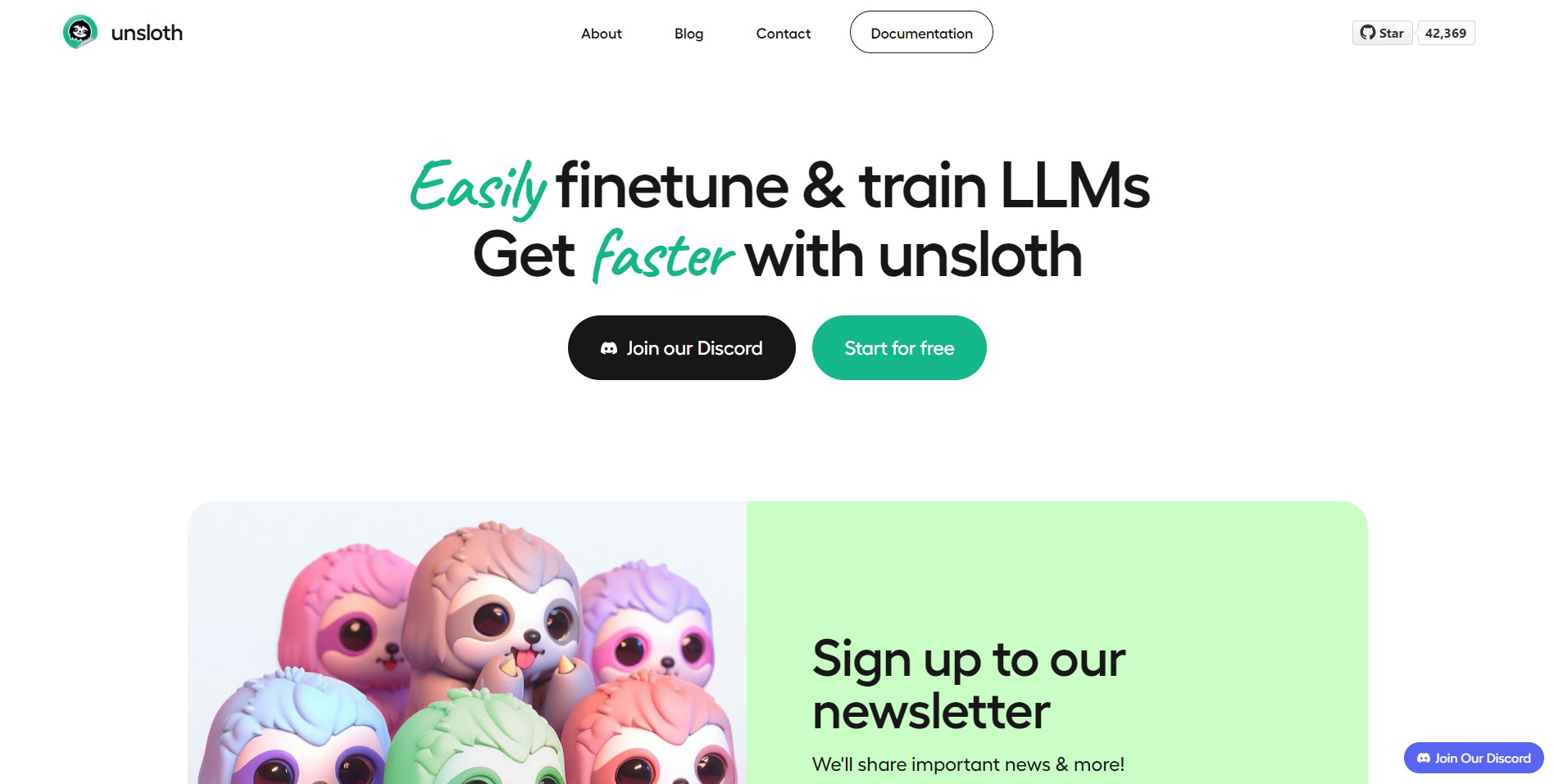
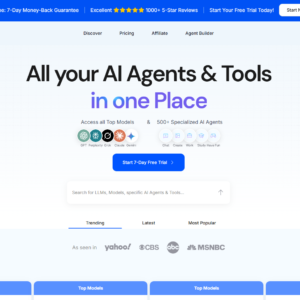
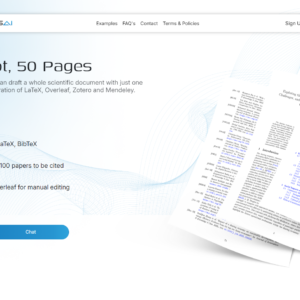
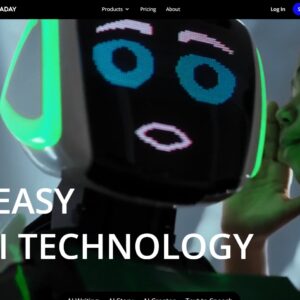
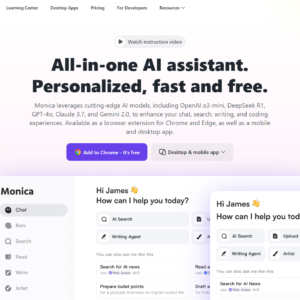
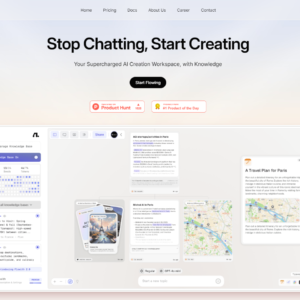
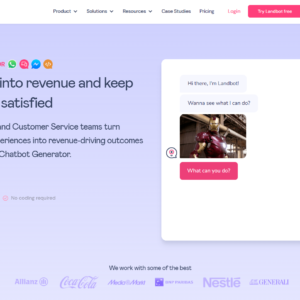
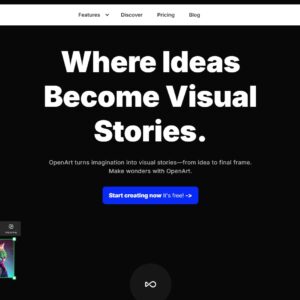
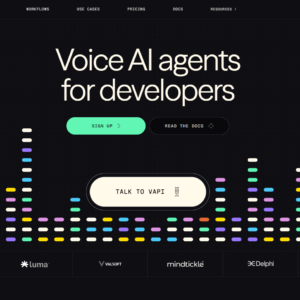
Reviews
There are no reviews yet.